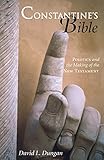Constantine's Bible : politics and the making of the New Testament / David L. Dungan
Material type: TextPublication details: Minneapolis, Fortress Press, c2007.Description: xii, 224 pages ; 21 cmISBN:
TextPublication details: Minneapolis, Fortress Press, c2007.Description: xii, 224 pages ; 21 cmISBN: - 9780800637903
- 0800637909
- 0334041058
- 9780334041054
- BS465 .D86 2007
| Item type | Current library | Collection | Call number | Copy number | Status | Date due | Barcode | |
|---|---|---|---|---|---|---|---|---|
 Archives
Archives
|
SAIACS Archives Room | Yandell Collection | ARCH YNDC 220.12 D738C (Browse shelf(Opens below)) | C.2 | Not for loan | 061264 | ||
 Books
Books
|
SAIACS General Stacks | Non-fiction | 220.12 D738C (Browse shelf(Opens below)) | Available | 058935 |
Browsing SAIACS shelves, Shelving location: General Stacks, Collection: Non-fiction Close shelf browser (Hides shelf browser)

|

|

|

|

|

|

|
||
| 220.1 W335B Biblical critical theory : how the Bible's unfolding story makes sense of modern life and culture / | 220.12 B223C Canon and biblical interpretation / | 220.12 C637C The cosmic mountain in Canaan and the Old Testament | 220.12 D738C Constantine's Bible : | 220.12 M478C The canon debate / | 220.12 M486F The formation of the Christian biblical canon / | 220.12 W773T Transforming Bible study : |
Includes bibliographical references (pages 159-214) and index
What a "canon" of scripture is--and is not -- Greek polis and the demand for accuracy -- Greek polis ideology within Second Temple Judaism and early Christianity -- Influence of Greek philosophy upon early Christianity -- Against pagans and heretics : Eusebius's strategy in defense of the Catholic scriptures -- An emperor intervenes : Constantine reshapes Catholic Christianity and its scriptures -- Epilogue -- Appendix A : references in Eusebius's Ecclesiastical history to early Christian writings -- Appendix B : writings considered "scripture" by one or another Christian group -- Appendix C : the library from Nag Hammadi -- Timeline of figures and events discussed in the text
Most college and seminary courses on the New Testament include discussions of the process that gave shape to the New Testament. David Dungan re-examines the primary source for the history, the Ecclesiastical History of the fourth-century Bishop Eusebius of Caesarea, in the light of Hellenistic political thought. He reaches new conclusions: that we usually use the term "canon" incorrectly; that the legal imposition of a "canon" or "rule" upon scripture was a fourth- and fifth-century phenomenon enforced with the power of the Roman imperial government; that the forces shaping the New Testament canon are much earlier than the second-century crisis occasioned by Marcion, and that they are political forces. Dungan discusses how the scripture selection process worked, book-by-book, as he examines the criteria used-and not used-to make these decisions. He describes the consequences of the emperor Constantine's tremendous achievement in transforming orthodox, Catholic Christianity into imperial Christianity. --From publisher's description
There are no comments on this title.

